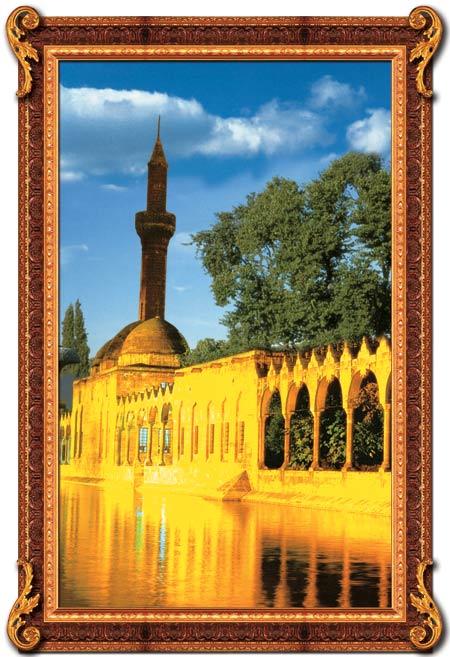The Prophet Abraham’s (pbuh) Pleasing Moral Values
Allah informs us of the pleasing moral features of the prophets sent by our Lord to warn and impart glad tidings to their people. All prophets, due to their submission to Allah and sincerity, as well as their just, humble, and honorable behavior, had exceedingly superior moral values. The Prophet Muhammad's (may Allah bless him and grant him peace) deep faith in Allah, not to mention his submission to, sincerity and respect for Him; the Prophet Solomon's (pbuh) constant giving of thanks to our Lord and raising His name, as well as displaying his determination, strength, and power when spreading the religion; the Prophet Job's (pbuh) and the Prophet Noah's (pbuh) patience; the Prophet Moses' (pbuh) sincerity; the Prophet Jesus' (pbuh) spiritual depth and submission to Allah; how the Prophet David (pbuh) turned to Allah and his attitude and behavior—all of these and a great number of other features have been given as examples for humanity.
Everyone must adopt the characteristics of these chosen people, whom Allah raised to prophethood, supported with knowledge and strength, and praised for their moral values, and implement them in their own lives. All believers must follow in the path of these worthy individuals, whom Allah made superior to the worlds, and implement their matchless moral values in their own lives.
The Prophet Abraham (pbuh), "the Intimate Friend of Allah"
Who could have a better religion than someone who submits himself completely to Allah and is a good-doer, and follows the religion of Abraham, a man of pure natural belief? Allah took Abraham as an intimate friend. (Surat an-Nisa: 125)
Our Lord has revealed that He took the Prophet Abraham (pbuh) as a friend. For that reason, he is known as Khalilullah (the friend of Allah), and remembered by that name. Indeed, the Prophet Muhammad (may Allah bless him and grant him peace) said: "Oh my Allah, the Prophet Abraham is Your friend [Khalil] and Your prophet."6
In the Gospel, we find the following statement concerning the Prophet Abraham (pbuh):
And the scripture was fulfilled that says: "Abraham believed God, and it was credited to him as righteousness," and he was called God's friend. (James 2:23)
The only aim of those who are friends of Allah and who love and fear (and respect) Him is to gain His good pleasure, mercy, and Paradise. Allah is always in their hearts and minds. Whenever they see things that give them pleasure, they say: How beautifully has Allah created them. He is worthy of praise. They call on Allah by His most beautiful names.
Such people know that all blessings come from Allah and constantly thank Him for whatever He sends to them. Whenever they encounter trouble or difficulty, they know that Allah is testing them and that whatever good it contains one day will be revealed. They demonstrate a pleasing patience, show submission, and engage in devout works in the hope of gaining their abode in the Hereafter. And, they take Prophet Muhammad's (may Allah bless him and grant him peace) words, "Praise be to Allah, Who created everything as is necessary, Who does not hasten anything He defers and determines. Allah is enough for me and sufficient"7 as a guide and thank Him for everything.
Allah encourages believers to reach this honorable state by seeking ways to draw closer to Him:
O you who believe. Fear [and respect] Allah, and seek the means of drawing near to Him... (Surat al-Ma'ida: 35)
In other verses, Allah says, "So flee to Allah" (Surat adh-Dhariyat: 50) and:
... So perform prayer, give alms, and hold fast to Allah. He is your Protector—the Best Protector, the Best Helper. (Surat al-Hajj: 78)
Allah also commands people to turn only toward Him:
Remember the Name of your Lord, and devote yourself to Him completely. Lord of the East and West—there is no deity but Him—so take Him as your Guardian. (Surat al- Muzammil: 8-9)
The Prophet Abraham (pbuh) Possessed Strength, Insight, and the Ability to Choose Right
 Allah,has made an example for those who believe: the wife of Pharaoh when she said, My Lord, build a house in the Garden for me in Your presencen and rescue me from Pharaoh and his deeds and rescue me from this wrongdoing people."(Surat at -Tahrim: 11) |
Allah states that the Prophet Abraham (pbuh) possessed "true strength and inner sight" (Surah Sad: 45). Insight means being able to look at events with wisdom and indicates deep understanding. Like all of the prophets, whom Allah made role models for humanity due to their deep faith, sincerity, and submission, the Prophet Abraham (pbuh) made correct decisions, looked ahead, and possessed insight.
Allah reveals in another verse that our Lord endowed the Prophet Abraham (pbuh) with rushdahu (right guidance), in other words, maturity:
We gave Abraham his right guidance [rushdahu] early on, and We had complete knowledge of him. (Surat al-Anbiya: 51)
The word rushdahu means proceeding, turning to, heading toward, with a divine truth, with a full and superior accuracy, and with sure steps. Strengthened by Allah with these pleasing qualities, perception, and understanding, the Prophet Abraham (pbuh) waged a great struggle against the pagans. In this struggle, his ability to look ahead, distinguish between right and wrong, and make correct decisions were great assets. All of these characteristics show that he was a servant who trembled before Allah and who scrupulously implemented the verses of our Lord. Indeed, Allah revealed that this great blessing will be imparted to those who fear (and respect) Him:
O you who believe. If you fear [and respect] Allah, He will give you discrimination, erase your bad actions, and forgive you. Allah's favor is indeed immense. (Surat al-Anfal: 29)
The superior qualities with which our Lord endowed the Prophet Abraham (pbuh) enabled him to wage a most effective and rational struggle against his pagan society. As a result, he and his followers prevailed.
Truth and choosing what is right are very important characteristics of believers. Our Prophet (may Allah bless him and grant him peace) constantly reminded his followers of them, as the few examples given below show:
Worship Allah alone and do not associate anything with Him … speak the truth.8
Let whoever is pleased that Allah and our Prophet love him always tell the truth.9
To whomsoever Allah wills good, He gives true understanding (of religion).10
Truth leads to piety, and piety leads to Paradise. A man persists in speaking the truth until Allah enrolls him as a truthful man. Falsehood leads to vice, and vice leads to the Fire (Hell). A person goes on telling a lie until Allah enrolls him as a liar.11
The Prophet Abraham (pbuh) Was a Pure Servant Who Always Thought about the Hereafter
Allah describes the Prophet Abraham (pbuh) and his line as being pure and always thinking of the Hereafter:
And remember Our servants Abraham, Isaac, and Jacob, men of true strength and inner sight. We purified their sincerity through sincere remembrance of the abode [of the Hereafter]. (Surah Sad: 45-46)
One of the fundamental characteristics that distinguishes prophets and believers from other people is their total concentration on earning Allah's good pleasure and His Paradise, to the exclusion of all worldly concerns. One of the clearest proofs of this is that they continue to warn their tribes, with great patience and purity, right up until the end of their lives.
 We do not send the Messengers except to bring good news and to give warning. As for those who believe and put things right, they will feel no fear and will know non sorrow. (Surat al-An'am:48) |
When performing their good deeds and religious observances, believers seek only His love, good pleasure, approval, and friendship. Prophet Muhammad (may Allah bless him and grant him peace) is the finest example in this regard, for he never stopped seeking Allah's good pleasure, mercy, and Paradise. Allah reveals that the prophets sent to people as a mercy and a blessing called their people to live by religion's moral values without expecting anything in return:
Say: "I do not ask you for any wage for it, nor am I a man of false pretensions." (Surah Sad: 86)
Say: "I have not asked you for any wage—it is all for you. My wage is the responsibility of Allah alone. He is witness of everything." (Surah Saba': 47)
In one hadith, our Prophet (may Allah bless him and grant him peace) says: "Allah accepts those deeds that were performed purely for His sake and that were meant to seek His pleasure."12 He calls on all people to behave with pure sincerity. When we look at the prophets' prayers and warnings, we see that they called their tribes to believe in Allah and perform good works, not to be deceived by this world's transient blessings, and to work only to gain the abode in the Hereafter.
One important quality that believers need to possess is the ability to focus all of their thought about reaching this abode. Everything they do or say must have the gaining of Allah's good pleasure as its only goal. Believers must always feel a longing for the Hereafter (the true life) and must never be bound to the life of this world. Of course, they will use the blessings of Allah in this world to thank Him and think about the originals of these blessings in the Hereafter. Yet these blessings must never become an end in themselves. Rather, each one must be seen as a means of winning Allah's good pleasure, explaining religion's moral values, and recalling the life of the Hereafter.
Thinking about Paradise's infinite beauties, rejoicing at Allah's promise of Paradise, avoiding Hell's endless torments, and keeping this in mind are important ways for believers to increase their closeness to Allah and their enthusiasm for living by the Qur'an's moral values. Otherwise, satan will seek to use their forgetfulness and encourage them to live without worrying about the Day of Judgment. Believers must never fall into this snare, and must always, like the Prophet Abraham (pbuh), think deeply about the Hereafter and explain it to others. Indeed, Allah says of the Prophet Abraham (pbuh):
Who would deliberately renounce the religion of Abraham, except someone who reveals himself to be a fool? We chose him in this world, and in the Hereafter he will be one of the righteous. (Surat al-Baqara: 130)
The Prophet Abraham (pbuh) Was a Distinguished and Auspicious Servant of Allah
In Our eyes, they are among the best of chosen men. (Surah Sad: 47)
 ... Abraham said, My Lord, make this a place of safety and provide its inhabitants with fruitds-all of them who believe in Allah and the Last Day"... (Surat al-Baqara: 126) |
The Prophet Abraham (pbuh) was one of Allah's servants to whom He vouchsafed the true path, honored with prophethood, and made distinguished in His own sight. The fact that he and his family were set apart from his tribe is revealed in the following verse:
Allah chose Adam and Noah, and the family of Abraham and the family of `Imran, over all other beings. (Surah Al 'Imran: 33)
The Prophet Abraham (pbuh) and his sons distinguished themselves from their fellow tribesmen by calling on their people to believe in Allah and telling them of His superior might and power. Allah reveals that, "We sent Noah and Abraham, and placed prophethood and the Book among their descendants…" (Surat al-Hadid: 26) and informs us that He has honored the Prophet Abraham's (pbuh) family with prophethood.
Being guided is an important sign of believers. Unbelievers bring evil to the world and those around them, instead of good, because those who deny Allah believe that their own interests are more important than anything else. Thus, they do not hesitate to harm others when their personal interests are at stake. On the other hand, believers bring only guidance, plenty, and abundance in both spiritual and physical terms. In fact, they are required to do so, for these are indications of their fear (and respect) for and profound faith in Allah. Given this, they carry out justice even when it goes against their own interests or those of the people close to them, do good deeds, oppose those who are cruel and unjust.
In the hadith, "The best of you are those who have the most excellent morals"13, our Prophet (may Allah bless him and grant him peace) states that believers with exemplary morals are auspicious individuals for their communities. Allah reveals the difference between those believers who behave according to Allah's prescriptions and always carry the beauty of religion's moral values with them, and those who lack this quality:
Allah makes another metaphor: two men, one of them deaf and mute, unable to do anything, a burden to his master. No matter where he directs him, he brings no good. Is he the same as someone who commands justice and is on a straight path? (Surat an-Nahl: 76)
 Messengers bringing good news and giving warning, so that people will have no argument against God after the coming of the Messengers... (Surat an-Nisa:165) We only sent you for the whole of humanity,bringing ood news and giving warning. But most of humanity do net know it. (Surah saba:28) |
The Prophet Abraham (pbuh) Had a Pure Heart
When he came to his Lord with an unblemished heart. (Surat as-Saffat: 84)
 Each person faces a particular direction so race each other to the good. Wherever you are, Allah will bring you all together. Truly Allah has power over all things. (Surat al-Baqara:148) |
Allah set the Prophet Abraham (pbuh), whom He had made His friend, apart from his pagan people and made him the leader to the true path for all believers.
Believers who take His prophets, with their superior moral characteristics, as role models for themselves must turn toward Allah to remove all of their superstitious and misguided beliefs from their hearts. Only by doing so can they become the people whom He loves and gain His good pleasure. In other words, they must turn to Allah with a pure heart. This purification also means turning away from the wickedness of earthly desires and satan's unwelcome incitements.
Allah reveals that He will "sift the rotten from the good" (Surah Al'Imran: 179). The cleanliness referred to here is a moral and spiritual one. Many people who live far removed from religion's moral values may well say: My heart is clean. Yet in reality, they are merely trying to ease their own consciences, for anyone who wants a pure heart must have a genuine belief in Allah, scrupulously abide by His commands, and be humble and submissive to Him. Allah describes the goodness and moral values that please Him in the following terms:
It is not [true] devotion to turn your faces to the East or to the West. Rather, those with true devotion are those who believe in Allah and the Last Day, the Angels, the Book, and the prophets; and who, despite their love for it, give away their wealth to their relatives, orphans, the very poor, and to travelers and beggars; and who set slaves free, perform prayer, and give alms; those who honor their contracts when they make them; and who are steadfast in poverty and illness and battle. Those are the people who are true. They are the people who guard against evil. (Surat al-Baqara: 177)
In another verse, Allah reveals that "[He] loves those who purify themselves" (Surat at-Tawba: 108). People may have spent a long time indulging in prohibited actions, and thus have wicked thoughts and low moral values. Yet the important thing is to repent to Allah, abandon those low moral values, and to turn to Allah with a purified heart.
Our Lord imparts the following glad tidings to those who believe:
But if anyone repents after his wrongdoing and puts things right, Allah will turn toward him. Allah is Ever-Forgiving, Most Merciful. (Surat al-Ma'ida: 39)
The Prophet Abraham (pbuh) Was "a Community in Himself"
Abraham was a community in himself, exemplary, obedient to Allah, a man of pure natural belief. He was not one of the idolaters. (Surat an-Nahl: 120)
The Prophet Abraham (pbuh) held Allah above all things, was genuinely devoted to Him, feared (and respected) only Him, and placed his trust only in Him. Although many people opposed him and even sought to martyr or burn him, he never wavered from his struggle of making Allah's religion prevail, thanks to his profound faith-based courage and submission.
 Who would deliberately renounce the religion of Abraham except someone who reveals himself to be a fool? We chose him in this world and in the Hereafter he will be one of the righteous. (Surat al-Baqara:130) |
All believers must seek to acquire these superior moral values. Even if they are alone, they must submit to Allah, be courageous and determined, sincere and strong willed. First of all, they must submit from the heart to our one and only Lord, fear (and respect) only Him, and take Him as a friend. That is because all believers, in whatever unbelieving society they find themselves and even if they are alone, must do their best to earn Allah's good pleasure, behave in the correct manner, fulfill their religious obligations, live by religion's moral values, and spread those values to others as a requirement of the Qur'an's moral values. They must always act in the knowledge that Allah constantly protects and supports them. Whoever exhibits the same moral values as the Prophet Abraham (pbuh), whoever devotes himself or herself to Allah with that same faithfulness and submission, may also hope to be given the strength of a one-man community of the faithful.
The Prophet Abraham (pbuh) Was Grateful to Allah
Allah has given people countless blessings. All of the beautiful things that surround humanity, from their own flawless bodies to the incomparable living things in the universe, are each a means of rendering genuine thanks to Allah. In fact, Allah reveals that:
 The Originator of the heavens and Earth. When He decides on something, He just says to it,"Be!" and it is. (Surat al-Baqara: 117) |
For this We sent a messenger to you from among you to recite Our Signs to you, purify you, teach you the Book and Wisdom, and teach you things you did not know before. Remember Me—I will remember you. Give thanks to Me, and do not be ungrateful. O you who believe. Seek help in steadfastness and prayer. Allah is with the steadfast. (Surat al-Baqara: 151-153)
As a servant who constantly gave thanks to Allah for the blessings imparted to him, the Prophet Abraham (pbuh) was a sincere believer whom Allah made a model for all Muslims. As Allah states in the Qur'an:
He was thankful for His blessings. Allah chose him and guided him to a straight path. (Surat an-Nahl: 121)
When we look at the prophets' moral values, as recounted in the Qur'an we see that they were believers who turned to Allah at all times, gave thanks to Allah for His blessings, called on His name, and exalted His glory. In one of his prayers, the Prophet Muhammad (may Allah bless him and grant him peace) said: "Praise be to Allah"14, thus drawing attention to the importance of gratitude.
Allah reveals that all believers must adopt such grateful behavior as a model for themselves and constantly give thanks to Him. All believers must immediately give thanks to Allah in moments of difficulty, when faced by any trouble or sickness, or when confronted with any form of cruelty or injustice. They must see that such events are created by our Lord, out of His wisdom, for Allah uses such tests to reveal their true moral values. He promises that those who exhibit the proper moral values will be given a great reward in this life and the next. Our Lord reveals that:
We will test you with a certain amount of fear and hunger, as well as loss of wealth, life, and fruits. But give good news to the steadfast. (Surat al-Baqara: 155)
Every person will taste death. We test you with both good and evil as a trial. And you will be returned to Us. (Surat al-Anbiya: 35)
The Prophet Abraham (pbuh) Was Submitted to Allah
When his Lord said to him, "Become a Muslim," He [Abraham] said: "I am a Muslim who has submitted to the Lord of all the worlds." (Surat al-Baqara: 131)
The word Islam comes from the verb salama, which means to submit. Therefore, being a Muslim means one who has submitted. Throughout his struggle with his tribe, the Prophet Abraham (pbuh) demonstrated deep devotion and total submission to Allah. No matter how difficult his tribe was or how much they tried to wear him down, the Prophet Abraham (pbuh) continued to spread Allah's religion with the great enthusiasm stemming from his joyous faith. This was true to such an extent, in fact, that he eventually left his tribe and all of his possessions behind and went to another land.

These prophets, who were sent to bring their people out of the darkness of idolatry and into the light of truth, knew full well that Allah created all people and the universe with a destiny, and that our Lord has set down every event that we will ever experience in both worlds. For that reason, they were esteemed individuals who were fully submitted to Allah, turned to Him constantly, and willingly obeyed His commands. Believers must consider the truth of the destiny revealed by Allah and live in willing submission to it.
The Prophet Abraham (pbuh) Was Tender-Hearted
 ... Then tc be one of those who believe and urge each other to steadlastness and urge each other to compassion. Those are the, Companions of the Right. (Surat al-Balad:17-18) |
Being compassionate, tender-hearted, affectionate, and full of love and forgiveness is yet another of the believers' characteristics praised by Allah. Our Lord reveals that the Prophet Abraham (pbuh) possessed such a tender-hearted nature:
... Abraham was tender-hearted and forbearing. (Surat at-Tawba: 114)
Abraham was forbearing, compassionate, penitent. (Surah Hud: 75)
As a manifestation of their joyous love for our Lord, believers make great efforts to be servants who please Allah and have the moral values revealed in the Qur'an. Being tender-hearted, compassionate, and affectionate are moral values frequently emphasized in the hadiths. Some of these read as follows:
When tenderness enters something, it always makes it more beautiful. When it is removed from something, it makes it flawed.15
Do you wish your heart to grow tender? Be compassionate to the orphan, caress his head, and give him to eat of what you eat. Your heart will grow tender.16
Be compassionate, that compassion may be shown to you. Forgive, that you may be forgiven.17
Allah is compassionate and loving, and loves the compassionate. The recompense He gives to the compassionate, He gives with nothing else.18
Allah reveals that the other prophets also possessed these superior qualities. For instance, He said of the Prophet Shu`ayb (pbuh), sent as a messenger to the tribe of Madyan: "... You are clearly the forbearing, the rightly-guided!" (Surah Hud: 87)
 Say: "My Lord has commanded justice.Stand and face Him in every mosque and call on Him, making your religion sincerely His As He originated you, so you will return." (Surat al-A'raf:29) | Urfa appears in historical sources as the region in which the Prophet Adam (pbuh), the Prophet Abraham (pbuh), the Prophet Job (pbuh), the Prophet Shu`ayb (pbuh), and the Prophet Elisha (pbuh) all lived. According to various accounts, an important part of the Prophet Abraham's (pbuh) life was spent in Urfa. The Gospel's Book of Acts indicates that the Prophet Abraham (pbuh) lived in Haran.
To this, he replied: Men, brothers, and fathers, listen to me! The God of glory appeared to our father Abraham while he was still in Mesopotamia, before he lived in Haran. "Leave your country and your people," God said, "and go to the land I will show you." So he left the land of the Chaldeans and settled in Haran. (Acts, 7:2-4)
(Side) In the picture is Urfa's Fish Lake, suggested as one of the places where the Prophet Abraham (pbuh) lived. |
The Prophet Abraham (pbuh) Was a Guide to the True Path
Allah manifests His name of al-Hadi (He Who leads to the true path) in the most excellent manner through the prophets' lives. The Prophet Abraham (pbuh) was sent to guide his own tribe to the true path by inviting them to belief in Allah. In the same way, the other prophets from the Prophet Abraham's (pbuh) line also directed their own tribes to the true path in guidance:

"I hold fast to the creed of my torebears Abaraham and Isaac and Jacob. We den't associate anything witth Allah. And that is how Allah has favored us and all humanity, but most do not give thanks." (Surah Yusuf:38)
And in addition to that, We gave him Isaac and Jacob and made both of them righteous. We made them leaders, guiding by Our command, and revealed to them how to do good actions, perform prayer, and give alms. And they worshipped Us. (Surat al-Anbiya: 72-73)
Allah also reveals the prayers of believers to be a good example for those who guard against evil:
[Believers are] those who say: "Our Lord, give us joy in our wives and children, and make us a good example for those who guard against evil." (Surat al-Furkan: 74)
The Prophet Abraham (pbuh) also called his tribe to the most honorable and delightful path, the path of Allah, and worked for his tribe's salvation in this world and the Hereafter. Allah reveals our Prophet's (may Allah bless him and grant him peace) message in the following verse:
Say: "Are we to call on something besides Allah that can neither help nor harm us, and to turn on our heels after Allah has guided us, like someone satan has lured away in the land, leaving him confused and stupefied, despite the fact that he has companions calling him to guidance, saying: 'Come with us!?'" Say: "Allah's guidance, that is true guidance. We are commanded to submit as Muslims to the Lord of all the worlds." (Surat al-An'am: 71)
One hadith mentions that the best way is that of Allah and the Prophet (may Allah bless him and grant him peace), thus: "The finest word is the Book of Allah. The best way is the way of Muhammad (may Allah bless him and grant him peace)."19
The Prophet Abraham's (pbuh) Prayers
In many verses of the Qur'an, Allah tells us of the prophets' prayers, each of which is a very wise example for those Muslims who are striving to draw closer to Allah. Learning these pure and sincere prayers, attempting to understand the moral values and spiritual depths of the individuals who uttered them, and praying to Allah with all sincerity are important ways of increasing one's closeness to Allah.
The Prophet Abraham's (pbuh) prayers contain great wisdom for all Muslims. He lauded Allah with the following words: "My Lord is the Hearer of Prayer" (Surah Ibrahim: 39), and drew attention to the importance of prayer:
I will separate myself from you and all you call upon besides Allah, and I will call upon my Lord. It may well be that, in calling on my Lord, I will not be disappointed. (Surah Maryam: 48)
He prayed to Allah for rule and wisdom, and that he might join the godly:
My Lord, give me right judgment and unite me with the righteous. (Surat ash-Shu'ara: 83)
He also sought from Allah being highly esteemed:
[My Lord,] make me highly esteemed among the later peoples. (Surat ash-Shu'ara: 84)
This is how he prayed for the life of the Hereafter:
And make me one of the inheritors of the Garden of Delight. Forgive my father—he was one of the misguided, and do not disgrace me on the Day they are raised up. The Day when neither wealth nor sons will be of any use—except to those who come to Allah with sound and flawless hearts. (Surat ash-Shu'ara: 85-89)
The Prophet Abraham (pbuh) also sought our Lord's forgiveness:
Our Lord, do not make us a target for those who do not believe, and forgive us. Our Lord, You are the Almighty, the All-Wise. ( Surat al-Mumtahana:5)
Our Lord. Forgive me and my parents and the believers when the Reckoning takes place. (Surah Ibrahim: 41)
He also asked for a godly heir to keep the religion alive after him:
My Lord, bestow on me a right-acting child. ( Surat as-Saffat: 100)
and prayed for his line:
My Lord. Make me and my descendents people who perform prayer. My Lord. Accept my prayer. (Surah Ibrahim: 40)
When Abraham said: "My Lord. Make this land a place of safety, and keep me and my sons from worshipping idols." (Surah Ibrahim: 35)

He prayed to Allah to make the city in which he lived a safe place and to provide the believers with fruits:
And when Abraham said: "My Lord, make this a place of safety and provide its inhabitants with fruits—all of them who believe in Allah and the Last Day." He [Allah] said: "I will let anyone who becomes an unbeliever to enjoy himself a little, but then I will drive him to the punishment of the Fire. What an evil destination!" (Surat al-Baqara: 126)
When performing a task, he asked Allah to accept it:
And when Abraham built the foundations of the House with Ishmael [he said]: "Our Lord, accept this from us. You are the All-Hearing, the All-Knowing." (Surat al-Baqara: 127)
He also prayed to Allah to make him and his line submissive to His will, reveal the methods of religious observance, and accept their repentance:
Our Lord, make us both Muslims submitted to You, and our descendents a Muslim community submitted to You. Show us our rites of worship and turn toward us. You are the Ever-Returning, the Most Merciful. (Surat al-Baqara: 128)
Our Lord, raise up among them a messenger from them to recite Your Signs to them, teach them the Book and Wisdom, and purify them. You are the Almighty, the All-Wise. (Surat al-Baqara: 129)
The Prophet Abraham's (pbuh) sincere devotion to Allah and absolute certainty in the Day of Judgment are why all believers can feel the complete godliness, sincerity, and submission in his prayers. When praying, all believers must use the Prophet Abraham (pbuh) as a role model and turn to our Lord as their only friend and helper.
The Prophet Abraham's (pbuh) Legacy
 Not so!All who submit themslves completely to Allah and are good-doers will find their reward with their Lord... (Surat al-Baqara:112) |
Allah informs us of the Prophet Abraham (pbuh) as a pure natural believer who does not associate anything with Allah:
When Abraham said to his father and his tribe: "I am free of everything you worship, except for Him Who brought me into being, Who will certainly guide me. He made it an on-going word among his descendants so that, perhaps, they might turn back." (Surat az-Zukhuf: 26-28)
The Prophet Abraham's (pbuh) legacy to all believers is monotheism. This legacy shows that he lived solely to gain Allah's good pleasure, took Him as his only friend, and feared (and respected) only Him. Throughout his life, the Prophet Abraham (pbuh) relayed the divine message of Allah's oneness and that no partners could be ascribed to Him. As Allah states:
When his Lord said to him: "Become a Muslim," he replied: "I am a Muslim who has submitted to the Lord of all the worlds." Abraham directed his sons to this, as did Jacob: "My sons. Allah has chosen this religion for you, so do not die except as Muslims." (Surat al-Baqara: 131-32)
The Prophet Abraham (pbuh) was a messenger who guided people to true path of Allah and this continued with his line: his sons Prophet Ishmael (pbuh) and Prophet Isaac (pbuh), his grandson Prophet Jacob (pbuh) and his son Prophet Joseph (pbuh), and the other holy prophets from that same line who later continued to call on their people to live by religion's moral values. Allah informs us of the Prophet Jacob's (pbuh) legacy in the following verse:
Or were you present when death came to Jacob and he asked his sons: "What will you worship when I have gone?" They said: "We will worship your Allah, the Allah of your forefathers, Abraham, Ishmael, and Isaac—one Allah. We are Muslims submitted to Him." (Surat al-Baqara: 133)
All prophets who came after the Prophet Abraham (pbuh) left the same legacy to their descendents: Submit to Allah wholeheartedly and die as Muslims. Whoever abides by the Prophet Abraham's (pbuh) legacy, serves only Allah, and spends his or her life for Allah's good pleasure may hope for His forgiveness and Paradise, the abode of eternal happiness.
 Those who shun the worship of false deites and turn towards Allah will have good news.Soo give good news to My servants. (Surat az-Zümer:17) Those who listen well to what is said and follow the best of it,they are the ones whom Allah has guided...(Surat az-Zumer: 18) |

















